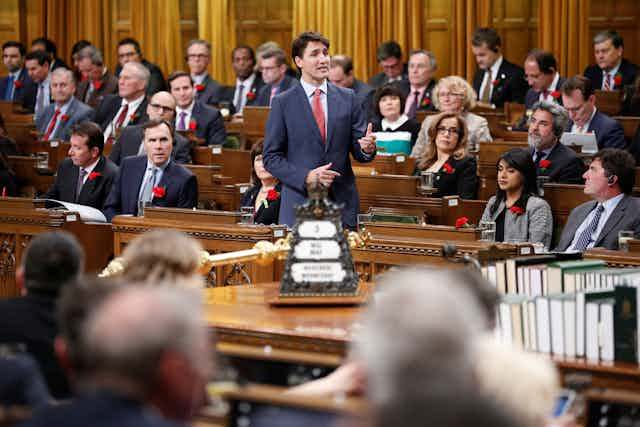Lobbying is a necessary component of representative democracy, yet poses one of its greatest threats.
Interest groups must be free to have a say. But the disproportionate influence of a few over many serves to seriously undermine democratic ideals, and comes at great cost to the taxpayer.
Given its importance, lobbying is an area that requires thoughtful laws that ensure as much transparency as possible, and prevent officials from abusing their power. In Australia, such laws are inadequate or missing. But other countries have taken important steps, and Australia can learn from their efforts.
Australia’s lobbying laws
For the most part, Australia has a system of ill-enforced state and federal codes, administered by partisan bodies.
At the federal level, there is the Ministerial Code of Conduct, and the Lobbying Code of Conduct. Both are weak.
The ministerial code ostensibly prohibits ministers from joining the industries they were responsible for in their portfolio for 18 months. Yet when Ian Macfarlane retired from parliament to head the Queensland Resources Council, having been industry and science minister just before retirement, and formerly the resources minister, the Prime Minister’s office found there was no conflict.
This is the stuff of farce. Macfarlane clearly breached the wording and spirit of the code, but its application is subject to wholly partisan arbitration. There’s also an enforceability issue here: the ministerial and lobbying codes contain no details on the punishment for breaches.
As a result, while a lobbyist might be deregistered, there are few theoretical consequences for a former minister. In practice, the proliferation of revolving doors suggest there are no consequences at all.
There is also the Australian Criminal Code, which prohibits the bribing of government officials. But enforcing this law is difficult: a violation requires the parties involved to have acted “dishonestly” and as part of a clear quid pro quo arrangement.
The law is enforced by the Australian Federal Police. In theory, significant fines and jail sentences are associated with breaches. However, it is nearly impossible to prove a quid-pro-quo arrangement, especially given the potential for delayed benefits offered by the “revolving door”. And the AFP lacks the necessary resources to do its job.
In reality, Australia’s lobbying codes are political red herrings: existing so governments may claim, falsely, there are safeguards against improper lobbying.
But, with the exception of state-based anti-corruption bodies (themselves lacking the necessary tools), the ability to police lobbying in Australia is almost nonexistent.
Lessons from overseas
Countries with similar common law and parliamentary traditions to Australia offer clear lessons on how to better police lobbying – most notably Canada.
For instance, the non-government sector in the US and UK does a better job of examining the pitfalls of lobbying, and helping voters to make more informed choices.
In the US, organisations such as the Centre For Responsive Politics exist to provide as much information and transparency as possible. And, in the UK, The Guardian has a dedicated and regularly updated section on lobbying.
Both of these organisations help voters make more informed choices, and better understand the nature and scope of the problem. But transparency does not appear to be enough: clear, enforceable laws are critical.
Even the US has more robust lobbying laws than Australia. While Donald Trump has done little to “drain the swamp”, his executive order more effectively limits the revolving door. And it is legally enforceable and punishable by fines or jail.
But perhaps the best example of meaningful laws is that of Canada, which still has many problems with lobbying, but has taken important steps to combat it.
Like Australia, Canada has made corruption-based forms of lobbying illegal, but it has gone further in minimising the difficulties in enforcing these laws posed by the revolving door. It has also taken important steps to improve transparency and accountability, with an independent Ethics Commissioner responsible for the oversight of breaches of lobbying and financing laws.
This has meant that potential breaches of lobbying laws by a prime minister, for example, are overseen by an impartial outsider, rather than their own department.
Further, Canada recognises “in-house” and “consultant” lobbyists. Australia’s code of conduct only recognises the latter. This is a critical distinction: in Australia, paid outside lobbyists are subject to the code, CEOs and billionaires aren’t.
Canada’s recognition of the different types of lobbyists evolved over time. Initially, Canada only made laws dealing with consultant lobbyists, but it realised how inadequate this proved to be, and updated its laws.
Canada’s lobbying regulation is far from perfect, but it at least has teeth. Australia can avoid much of Canada’s long history of legislative redrafting by using its experience to get it right the first time.
Important first steps
The problems of lobbying are as old as democracy. Complaints about lobbying date back at least to Plato, who noticed that a skilled orator can best an expert in public debate.
Much later, in 1850, the US senator Thomas Benton registered his own complaints. He was being lobbied to help fund the construction of a private company’s ship. He resisted, but hinted he might be amenable provided one important condition was met. Once built, insisted Benton to a lobbyist, the ship should be used to “take all such rascals as you out of the country.”
Benton’s words capture the sentiments of many Australians today, and reflects the trend toward increased distrust and dissatisfaction in our political system. Yet Benton’s remedy is a touch too drastic. Instead, Australia should seek the harm-reduction approach, and drastically bolster its lobbying laws.
The problems of lobbying are endemic to all democracies, yet other countries are taking steps to combat these problems, and offer lessons on how to catch up.
Decades of improving the legal framework around lobbying already exists in other countries. Australia can learn from them.

